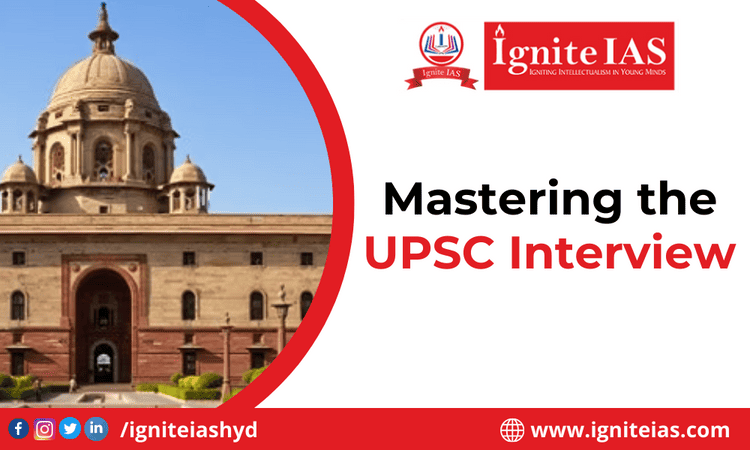Introduction:
The UPSC examination, with its three stages – Prelims, Main, and the Interview round, is a rigorous process that filters candidates for prestigious positions like IAS and IPS. Among these, the Interview round holds paramount importance, influencing the final merit list alongside Main marks. This phase demands a unique set of skills, encompassing personality assessment, communication prowess, and an in-depth understanding of socio-economic issues. To guide you through this critical stage, we present a practical guide tailored for IAS/IPS aspirants at Ignite IAS Academy, offering essential dos and don’ts for acing the UPSC interview.
Preparing for the Interview Round:
Commence Preparation Early:
Initiate your interview preparation immediately upon receiving your Mains results. Becoming a confident and well-groomed individual is a gradual process, emphasizing the need for early and consistent effort.
Do not Panic:
Facing the UPSC board can be intimidating, but panic is counterproductive. Dedicate yourself to adequate preparation, leveraging online resources, including interview round videos, to anticipate possible questions and develop a calm facade.
Dos and Don’ts While Answering:
Authenticity Matters:
Avoid portraying a fabricated personality. Honesty is crucial, as experienced board members can easily discern falsehoods. Refrain from providing false information about your personality, hobbies, or achievements.
Art of Answering:
– Avoid Blabbering: Excessive talking may indicate a lack of confidence or uncertain knowledge. Organize your thoughts before responding, delivering concise and measured answers.
– Speak to the Point: Listen carefully to questions and respond directly, avoiding unnecessary elaboration. Articulate your thoughts clearly and thoughtfully.
– Stay Humble and Respectful: While disagreements may arise, maintain humility and respect. Refrain from unnecessary arguments or sounding arrogant, especially when expressing differing viewpoints.
– Balance in Views: Provide balanced perspectives without criticizing government, caste, race, or religion. Uphold a positive tone even when addressing challenging topics.
Maintaining Decorum:
Body Language and Positivity:
– Positive Body Language: Project a positive demeanor through body language. Positivity is infectious, so maintain a pleasing personality.
– Avoid Fidgeting: Nervousness can be perceived through fidgeting. Practice composure to eliminate unnecessary movements during responses.
– Appropriate Reactions: React appropriately, such as smiling at board members’ jokes. However, refrain from unnecessary jokes of your own, especially in a formal setting.
– Professional Attire: Dress professionally in decent and formal clothing to convey a sense of professionalism.
Bottom Line:
To conclude, effective preparation and dedication are paramount for acing the UPSC Interview round. Begin preparations promptly upon receiving Mains results, staying updated on current affairs. Practice mock interviews to enhance your composure and consider breathing exercises to ease nerves. Remember to carry all necessary documents to the interview hall.
Additional Tips for Ignite IAS Academy Aspirants:
– Mock Interviews: Engage in mock interviews to simulate the actual experience. Practice with peers, mentors, or through online resources to refine your responses.
– Continuous Current Affairs Updates: Stay consistently updated on current affairs. Dedicate specific time each day to enhance your knowledge of ongoing events.
– Peer Discussions: Engage in discussions with fellow aspirants at Ignite IAS Academy. Sharing perspectives and insights can broaden your understanding of diverse topics.
– Feedback Incorporation: Seek feedback on your mock interviews and incorporate constructive criticism. Use it as a tool for improvement in subsequent practice sessions.
– Mindfulness Techniques: Explore mindfulness techniques, such as meditation or visualization, to cultivate mental composure and focus during the interview.
Frequently Asked Questions (FAQs):
1. Q: How can I effectively handle disagreements with the panel during the interview?
– A: Approach disagreements with humility and respect. Present your viewpoint calmly without sounding confrontational, emphasizing a balanced perspective.
2. Q: Is it essential to wear formal attire for the UPSC interview?
– A: Yes, wearing decent and formal clothes is crucial to showcase professionalism and make a positive first impression on the interview panel.
3. Q: How can I overcome nervousness during the interview?
– A: Practice regular breathing exercises to manage nerves. Engaging in mock interviews and staying well-prepared can also boost confidence and reduce anxiety.
4. Q: Can I incorporate personal anecdotes in my responses?
– A: Yes, sharing relevant personal anecdotes can add authenticity to your answers. However, ensure they align with the context and maintain professionalism.
5. Q: What should be my approach if I don’t know the answer to a question?
– A: Admitting a lack of knowledge is better than providing incorrect information. Stay calm, express a willingness to learn, and avoid guessing.
In conclusion, mastering the UPSC interview is a holistic process that involves thorough preparation, authentic communication, and maintaining composure. Aspire towards continuous improvement, and success will follow. Best of luck in your UPSC journey!




